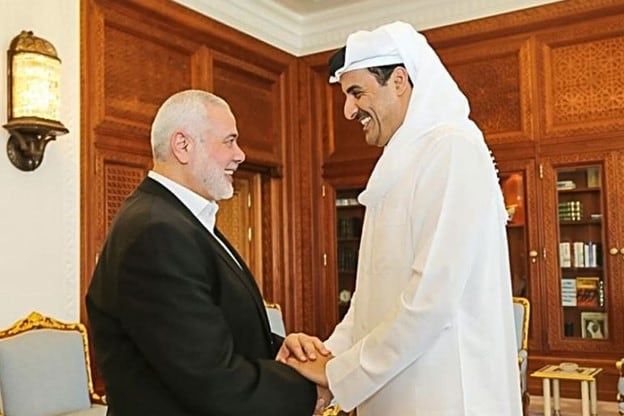
Hamas political bureau head Isma'il Haniya with Qatari Emir Sheikh Tamim bin Hamad Aal Thani (Source: qudspress.com)
In the so-called negotiations to free the hostages held by Hamas in Gaza, Qatar is serving Hamas. In fact, Qatar is Hamas and is not an honest broker. The hostages guarantee Hamas members' lives; thus, they aren't interested in releasing Israeli hostages, just Americans – and Russians, who will be freed under pressure from Russian President Putin, to whom Hamas owes a lot.
Hamas murdered at least 32 Americans on October 7, and kidnapped at least 13. How can these American hostages be freed? Certainly not by pleasing the Qataris, who are demanding, and receiving, constant praise from the Americans.
The release of the American hostages will be achieved in precisely the opposite way: through pressuring Qatar.
There are problems, though. For years, U.S. administrations, including this one and the previous one, have been aligned with Qatar.
In order to save the hostages, we must first set the record straight. Qatar has been playing a deadly double game with the U.S. for many years. It supports all Islamist terrorist organizations (ISIS, Al-Qaeda, Taliban, Hamas, and Hezbollah). Worst of all, in 1996, it hid future 9/11 mastermind Khalid Sheikh Mohammed (KSM) in Doha, and when the FBI came to arrest him, informing only the Qatari Emir, KSM disappeared within hours. Richard Clarke, adviser to two U.S. Presidents, attested to this in his book and in the media.
Many Americans believe that they owe Qatar for its hosting of the U.S. CENTCOM base. The truth is precisely the opposite: It is Qatar that owes the U.S., for locating this base there. Without this base's presence in the country, Qatar would disappear within less than a week – its neighbors would eat it up.
A single statement by a U.S. Department of Defense official, about relocating – or even considering relocating – this base from Qatar to another country that is not a state sponsor of terrorism is all it would take to get the American hostages released. Even indicating that the U.S. has other options besides Qatar would do it.
SUPPORT OUR WORK

The Qataris would have Hamas quickly dispatching the Americans on a bus to freedom, no ceasefire required. And this is what the American families of the hostages should be demanding from their members of Congress.
Qatar exists today only because the American administrations have accepted their double game. Criticized for hosting Hamas commanders in Doha, the Qatari prime minister hastened to say that it was the Americans who asked Qatar to bring them there. This may be true; American administrations are capable of damaging their own interests. But America should now ask Qatar to expel the Hamas commanders – or, better yet, extradite them to the U.S. to stand trial for murdering Americans.
To the families of the hostages, I say: The American administration will do none of this. Like its predecessors, this administration is too closely linked to Qatar’s interests.
But the families are not. They can raise hell for the release of their loved ones – in media, in Congress, and by demonstrating in front of the Embassy of Qatar on M Street in Washington, D.C. Qatar is extremely and incredibly sensitive to being exposed in any way as a terror-sponsoring state.
Qatar knows what it would mean for it to be defined as what it is: It means being wiped off the map. Qatar supports Hamas, but it will not commit suicide for it. Show Qatar where this support is taking it, and it will bring about the release of the hostages – because Qatar is Hamas's lifeline and Hamas will do Qatar's will.
Just one demonstration in front of the Qatari Embassy, with posters stating that Qatar is a state sponsor of terrorism, will prompt Qatar to get the American hostages released.
With regard to the Israeli hostages, the Israeli government has an acute problem. Over the last decade, Prime Minister Benjamin Netanyahu has allowed Qatar to funnel $1.5 billion to Hamas, and those funds built Hamas' military force.
Netanyahu has the blood of 1,400 murder victims on his hands.
He will not confront Qatar because that would be self-incriminating – because he would then be asked how he allowed $1.5 billion to be transferred by an enemy – Qatar – to Hamas.
Netanyahu even blocked the closure of the Israel office of the Qatar/Hamas megaphone Al-Jazeera TV – a move that was approved even by Israeli legal authorities keen to preserve media and human rights. Al-Jazeera constantly endangers Israeli soldiers, serving Hamas both ideologically and militarily. Netanyahu's blocking of this closure is a betrayal of his own soldiers.
Israeli families, like their American counterparts, can act independently of their government. In fact, their doing so would give the Israeli government an alibi – it's not us, the Israeli government, attacking you, Qatar, it's the families; we cannot control them because we are a democratic state.
The families can appeal to parliaments in every country to declare Qatar a state sponsor of terrorism – there's ample proof of that, including lawsuits underway in the U.S. and Europe. They should ask states like the Czech Republic, whose policies and principles are admirable, to take the case against Qatar to the International Criminal Court (ICC) on their behalf. They should go to Germany, that owes the Jewish state so much, and ask it to take the case to the ICC. At the very least, they can ask Germany to give the hostages German passports, like Raoul Wallenberg did in World War II.
Needless to say, advertisements in newspapers exposing Qatar for what it is, along with Congressional hearings like in 2017, and divestment from Qatari businesses such as luxury hotels, can also help with regard to all the hostages, of all nationalities.
But this U.S. administration must rescue its own citizens – and pressuring Qatar will achieve this easily.
*Yigal Carmon is Founder and President of MEMRI.




